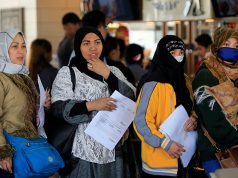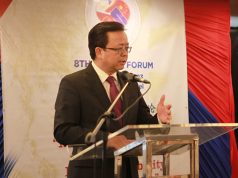Most Filipinos often know someone who moved overseas to work and support their family.
Rachel, a healthcare worker in the United States, is one of these hardworking overseas Filipino workers .
Starting out as a part-timer in Japan until she eventually managed to settle down in the US with her children, Rachel has been an OFW for 40 years to support her clan. These include her five younger siblings, nieces and nephews who are still pursuing their studies.
“Back then, I had left behind [my] two sons who were still studying in the Philippines. Because my siblings took care of them for me, I helped pay for their house, daily expenses, and their children’s allowance and schooling,” Rachel said.
“I wasn’t saving anything, but I was happy to help them because I’ve been through the same situation with my own children,” she added.
Based on the Philippine Statistics Authority data, the number of OFWs who worked abroad from April to September 2021 was estimated at 1.83 million, from 1.77 million in 2020.
Like Rachel, several other OFWs also struggle to save up and manage their savings for their family at the same time–a challenge recognized by the digital remittance platform WorldRemit.
Education as a priority
According to the remittance company’s data, attaining “quality education” has been cited as the main global reason money is sent internationally, which is also often top of mind for families who depend on remittances.
Every enrolment and graduation season, the money transferring platform reported in separate data that remittances almost double and enable increased attendance and higher educational attainment among children.
“We often see OFWs making adjustments to their daily habits to sustain remittances home, and realize that they are usually providing funds to many members of their family, and sometimes their community,” WorldRemit Asia Pacific head Earl Melivo said.
As remittances are one of the ways OFWs support their families, WorldRemit commits to offering convenient money transferring, as well as other wide range of options, including bank transfer, cash pickup, airtime top up and mobile money.
“Remittances make a tangible difference in the lives of migrant workers’ loved ones. In cultures like ours, even extended family are empowered to achieve their goals and aspirations,” Melivo said.
Such an app has helped OFWs like Rachel to still make their presence felt within their families despite being miles away.
Today, the nieces and nephews which Rachel has helped put through school have now started their own careers, with two of now engineers while another is now nurse in Australia.
On top of her relatives’ education, Rachel has also helped her siblings and mother build their own homes and purchase a car, having gone a long way in her career.
“Many Filipinos choose to find work overseas because of the better pay. However, OFWs should still have the discipline to religiously set aside money for their own future,” she said.
—Intern, Bless Aubrey Ogerio










